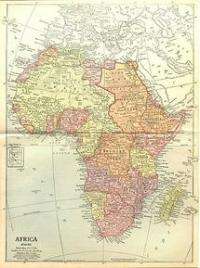Interactions between the ancient Africa and ancient Greece are explored in the book
Academics from the Universities of Oxford and Warwick have shed new light on the history of interactions between the classical world, Africa and the Middle East.
In a new book of essays which has just been launched, co-editors Dr Tessa Roynon (Oxford University), Dr Daniel Orrells and Dr Gurminder Bhambra (both at Warwick) argue that the 1990s controversy over Martin Bernal's thesis was misdirected. Bernal argued in his provocative book, Black Athena (1987), that the classical civilization underpinning western culture traces its roots to ancient Africa and the Near East, and that these roots were whitewashed from the history of the West in the 18th and 19th centuries. His claims initiated a fiercely-contested debate.
In their new book, African Athena, Drs Roynon, Orrells and Bhambra argue that in focusing so exclusively on whether or not Bernal was ‘right’, scholars have left unexamined many fruitful lines of inquiry. ‘We have reframed the terms of the debate', said Dr Roynon, who is a research fellow at St Peter's College and the Rothermere American Institute. 'We are less interested in whether the African 'origins' of Greek civilization can be proved, and more interested in how studies of the extensive and undeniable interactions between Greece, Rome, the Middle East and Africa over many centuries can shape our understanding of history, of the academy and of the modern world. Politically, there is a huge amount at stake in these questions.'
As the new collection shows, the ways in which modern slavery brought black people into contact with Greek and Roman texts has given rise to many classically-based forms of resistance to European and American power. For example, in 16th-century Granada there lived an African ex-slave, Juan Latino, who was a classical scholar; his work and its impact are documented here by Professor Mira Seo. Several other essays analyse the ways in which more recent black activists and intellectuals have drawn on the connections between Graeco-Roman and ancient African worlds to advance their cause.
The contributors to African Athena: New Agendas, who hail from universities in the U.S., the Netherlands and New Zealand as well as the U.K., include Classicists, historians of ancient and modern culture, sociologists, and scholars of modern literature. Their topics range from Libya’s pre-histories to the American abolition movement; from the role of the Near East in the evolution of the ancient ‘Greek’ novel (discussed here by Oxford’s Professor Tim Whitmarsh) to modern Caribbean poetry. Martin Bernal himself has written the Afterword: here he links the ‘origins’ of Black Athena to the political climate that enabled the 1991 U.S. invasion of Iraq.
‘As a whole’, Dr Orrells explains, ‘this eclectic collection explores the impact of the modern African diaspora on Western notions of history and culture. It examines the role Bernal’s claim has played in European and American understandings of history, and in classical, European, American and Caribbean literary texts. African Athena examines the history of intellectuals and literary writers who contest the white, Euro-American accounts of the classical past and of its influence on the present’.
Provided by Oxford University























